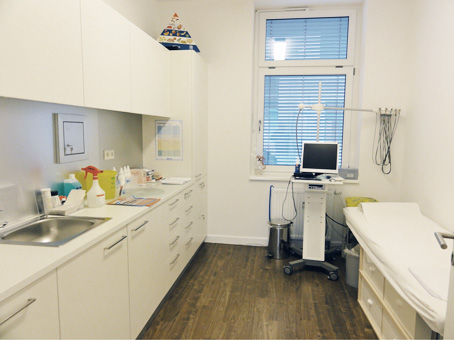Laboratory tests
-
Sonography
-
Blood tests
-
Stool tests
Ultrasound of the abdominal organs:
Tumors, chronic diseases of the organs, stone diseases, calcifications and enlargement of the abdominal aorta and the effects of obesity can be detected in the early stages, without radiation exposure, by using computer tomography.

Ultrasound of the carotid arteries:
Changes in the flow conditions and the vessel walls, for example due to high cholesterol levels and nicotine consumption, can be detected in the early stages, before a stroke has occurred due to narrowing of the arteries. In addition, the vessel wall thickness of the carotid arteries allows conclusions to be drawn about calcification of the coronary arteries. Strict treatment of risk factors can prevent complications (such as stroke). Smokers, older than 40 years of age or patients with diabetes, high blood pressure or high cholesterol levels particularly benefit from this examination.
Ultrasound of the veins:
The venous valves can be tested for good closure. Standing and sitting occupational activities over a long period of time can lead to stretching of the venous valves, followed by varicose veins and painful leg swelling. Prevention measures can then be initiated immediately.
|
→ |
Risk of thrombosis:
If thrombosis or pulmonary embolism occurs frequently in the family, hereditary changes in the structure or quantity of coagulation factors are usually responsible. These changes can be easily identified in a coagulation analysis. This test is particularly useful for members of such a family or for women who smoke and take the pill or are pregnant. It is precisely in combination with these factors that a familial coagulation disorder can lead to thrombosis.
Risk of arteriosclerosis:
By simply taking a blood sample, checking your pulse and measuring your blood pressure on your arms and legs, your individual risk of heart attack, stroke and amputation due to circulatory problems can be estimated.
HIV test/hepatitis serology:
HP test:
A specific antibody test can be used to determine within a few minutes, whether the pathogen Helicobacter Pylori is the cause of your long-lasting stomach pain, such as belching or stomach pressure.
PSA:
Can provide information about prostate cancer.
Early detection of osteoporosis:
A blood sample can reveal a bone metabolism disorder. Recommended for ages 40 and over.
|
→ |
FOB test
The usual tests for blood in the stool have a detection rate of 50-60% and the test results can be influenced by food and medication. A new test method (FOB test) with specific antibodies is much more sensitive and less susceptible to interference, so that up to 90% of patients with colon cancer can be detected.
|
→ |
